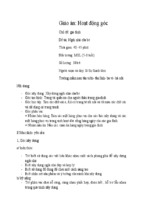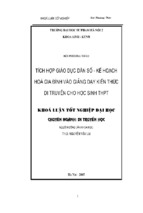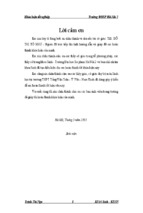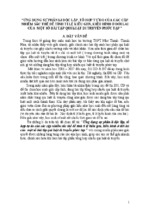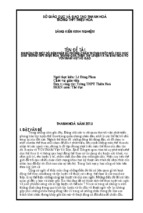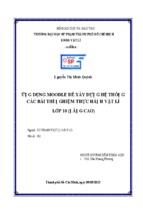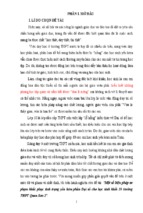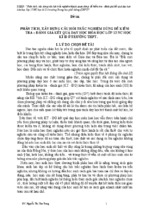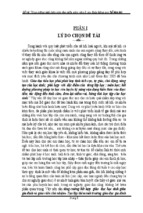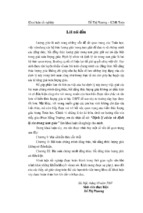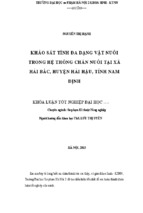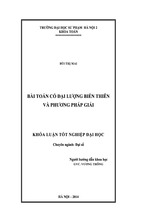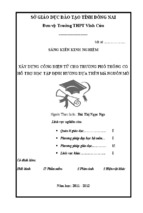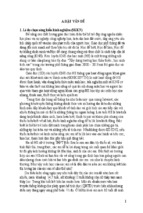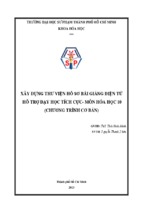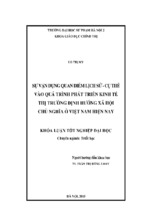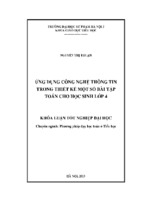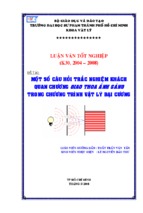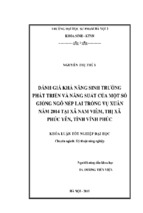I. INTRODUCTION
1.1. Rationale
Language is a means helping people to communicate with each others.
Without language, people can not understand each other properly. However, to
master a language is not easy at all. Of the four language skills -Listening,
Speaking, Reading, and Writing-that all language learners are supposed to
acquire, listening is believed to be the most challenging due to the complex and
subtle nature of listening comprehension in L2 or foreign language. It takes
much time and effort to make progress in this skill.
At my school, Yen Dinh II secondary school, students often feel nervous
during listening lessons and they can hardly listen to anything which causes the
bad result in learning the listening skill. That’s why I chose the topic
“Difficulties encountered by the 11th form students when learning the English
listening skill and suggestions”. I hope this will help both teachers and Sts to
realize the factors obstacling the students in learning the English listening skill,
then find out solutions to this problem.
1.2. Purpose of the study
The main purpose of the study is to probe difficulties encountered by the
11th form students in learning the listening skill. This also offers some
appropriate suggestions to better the current context.
1.3. Scope of the study
This study is conducted among the 11th form Sts at YD2SS during the
school year 2013- 2014 in order to perceive difficulties in learning the listening
skill of the 11th form Sts
1.4. Methodology of the study
Both qualitative and quantitative methods are used.
1
First of all, for the theoretical basis, a lot of reference materials on
listening skills have been collected, analyzed and synthesized carefully with the
due consideration for the students’ learning situations.
Secondly, a survey questionnaire has been conducted with the students to
collect the data. Then, follow-up interviews have been carried out with students
to gather the most reliable data for analysis to find the answers to the research
questions mentioned above.
1.5. Significance of the study
This study may provide insights into the process of learning the listening
skill for the students. It can help students understand why they have difficulties
in the listening skill. It also gives some suggestions to help students overcome
the difficulties. It may play a crucial role in enhancing the listening skill to the
students.
2
II. DEVELOPMENT
2.1. Theoretical background of the listening skill
2.1.1. What is the listening skill?
There have been a number of definitions of listening by different linguists
but one of the most popular ones is by Pearson (1983) . He stated “Listening
involves the simultaneous organization and combination of skills in Phonology,
Syntax, Semantics, and knowledge of the text structure, all of which seem to be
controlled by the cognitive process. Thus it can be said that though not fully realized,
the listening skill is essential in acquiring language proficiency”.
2.1.2 The importance and purposes of the listening skill in the language
learning process
It can’t be denied that listening plays a vital role in our daily lives. People
listen for different purposes such as entertainment, academic purposes or
obtaining necessary information.
The importance of the listening skill can not be denied, however, different
scholars give their own views about how it is important.
Some practitioners believe that language learning is a linear process,
starting with the spoken language medium (listening and speaking) and then
moving to the written medium (reading and writing). Listening is the means to
initiate oral production, which tends to be an imitation of spoken texts. The
second view places listening along with the other three language modalities
(speaking, reading and writing) in an intersectative mode. All four modalities
should be thought simultaneously, so that practice in one area can reinforce and
develop the other forms of communication (Rivers, 1987).
A third view emphasizes listening as the primary source of linguistic
input, which activates the language learning process. Rost (1994:141-142)
claimed that 'Listening is vital in the language classroom because it provides
3
input for the learners. Without understanding input at the right level, any
learning simply cannot begin”. According to this scholar, without understanding
input appropriately, learning simply can not get any improvement. In addition,
without listening skill, no communication can be achieved.
Though different linguists give a number of views about the importance
of listening, they all claim that listening play a vital role in communication and
in learning a language. Listening is essential not only as receptive skill but also
to the development of spoken language prophecy
2.1.3. Phases in the listening learning process
Pre listening: Pre-listening activities that precede the listening passage should
prepare the students for the comprehension task by activating the students'
vocabulary and background knowledge or by providing the students with the
information needed to comprehend the content of the listening text (Dunkel,
1986; Rogers & Medley, 1988; Vandergrift, 1997).
While- listening activities should help the students develop the skill of
extracting meaning from the speech stream. While-listening activities can be
shortly defined as all tasks that students are asked to do during the time of
listening to the text. The nature of these activities is to help learners to listen for
meaning, that is to elicit a message from spoken language.
Post- listening activities :The post-listening stage comprises all the exercises
which are done after listening to the text. Some of these activities may be the
extensions of those carried out at pre- and while-listening work but some may
not be related to them at all and present a totally independent part of the
listening session. Post-listening activities allow the learners to ‘reflect’ on the
language from the passage; on sound, grammar and vocabulary as they last
longer than while-listening activities so the students have time to think, discuss
or write (Rixon 1986:64,97 and Underwood 1989: 78).
4
2.1. 4. Potential problems in learning to the English listening skill
There are a lot of potential problems in learning a language skill. For the
listening skill, Underwood (1989) offers seven conceivable causes of obstacles
to efficient listening comprehension.
2.1.4.1. Speed of delivery
Sometimes, listeners cannot control the speed of delivery, especially for
beginners. Learners often feel that the utterances disappear before they can sort
them out or they can get the message. The reason is that speakers speak too fast,
learners can not keep up with the speed. They can not hear what is being spoken.
2.1.4.2. Inability to get things repeated
Secondly, listeners cannot always have words repeated. This is a serious
problem in learning situations. This problem happens not only in the classroom,
but outside it as well. Outside the classroom, listeners are not always able to ask
the speaker to repeat his utterance. This can lead their failure in listening.
2.1.4.3. Limited vocabulary
When listening, there are words or phrases that the listeners do not know.
In other words, listeners have a limited vocabulary. The listeners may wonder
about the meaning of new words, so they can not concentrate on listening the
next part of the listening.
2.1.4.4. Unrecognizing the signals
Fourthly, listeners may fail to recognize the signals, which indicate that
the speaker is moving from one point to another, giving an example, or
repeating a point. In informal situations or spontaneous conversations, signals
5
are more vague as in pauses, gestures, increased loudness….These signals are
not easy to be recognized at all.
2.1.4.5. Listeners’ lack of contextual knowledge or background knowledge
Another problem is that listeners may lack contextual knowledge. That is
the knowledge that we possess previously about the context or passage (Ur,
1985) which can helps us make some predictions and understand the listening
passage more easily
2.1.4.6. Inability to concentrate
Sixthly, it can be difficult for listeners to concentrate in a foreign
language. This can be caused by a number of things such as : the bad quality of
machines, the poor quality of listening materials. Other reason for loss of
concentration is that the topic is not interesting or not familiar and learners find
it difficult to understand.
2.1.4.7. Learning habits
The last is students may have established some learning habits such as a
wish to understand every word. Therefore, Sts often feel nervous when they can
not hear some words. This leads to their lack of confidence in listening.
2.2. The setting of the study
2.2.1. The setting of the school and objectss
The study was conducted at YD2 which was established in 1972 in Yen
Dinh district, Thanh Hoa province.
YD2 has 30 classes at the moment. Classes at the school are very crowded
with from 35 to 50 students in each class. In addition, the desks are often
6
arranged traditionally with rows of four desks with a narrow isle in the middle
and two narrower on the sides. There is no other empty space left where teachers
and students can move to and from if they conduct different interaction
activities. Also, unavoidable noise in a big class usually has bad effects on
students’ concentration and sound quality.
Like in other schools, students at YD2SS are taught all the subjects, one of
which is English. English is taught in classrooms with five parts: Listening,
Speaking, Reading, Writing and Grammar within 40 weeks.
2.2.2. The students’ background and their English levels
The 11th form students at YD2SS are aged from 16 to 17. They came from
different places of Yen Dinh district. Most of them have learnt English including
the listening skill since they were at grade 6. However, the students’ level in
English is very low. Moreover, they do not have clear determination on English
learning goals. Besides, most of their families live on agriculture so that they do
not have the best conditions to learn English, especially the listening skill. In
addition, in their opinion, it is not easy to master English and they do not pay
much attention to it while the most important ones are mathematics, physics and
chemistry.
2.2.3. Listening text books
Like students at other secondary schools, students at Yen Dinh 2 use
English books published by Education publishing house, Grade 10 students use “
Tieng Anh 10”, Grade 11 students use “Tieng anh 11”, and “Tieng anh 12” is
used for grade 12. All of students here learn the Basic English level.
“Tieng Anh 11” is the sixth volume which continues a series of English
textbooks for grade 6 to grade 10. Unlike the old textbooks where language
input was presented in terms of linguistic structures which were then
mechanically practiced through a series of rule-focused exercises, “Tieng Anh
7
11” is underpinned by a theme-based approach to the introduction of language
input. Lessons are arranged according to topics which are true to life.
“Tieng Anh 11” consists of sixteen units; each unit presents a theme
which is relevant to many aspects of the daily life: friendship, birthday party,
hobbies, Tet holiday and so on. Those themes are represented via five sections:
reading, speaking, writing, listening and language focus respectively.
Besides “ Tieng Anh 11”, teachers at YD2SS do not use any other listening
materials to teach the students.
2.3. Difficulties encounterd by the 11th form students in the listening skill
I taught 2 classes of the 11th form last year so I had a chance to observe
my sts during listening lessons. I took note what they felt, what they did as
materials for this study. Besides, I often spend time to observe sts in other
classes while they are being taught by different teachers
2.3.1. Sts’ attitude towards the importance of studying the listening skill.
Most of the 11th grade students at YD2SS highly appreciate the
importance of listening skill. Of four English skills, however, listening seems to
be the most difficult. Therefore, they are not confident when learning this skill
and self-rate their proficiency levels in listening skills “average or bad”.
2.3.2. Problems related to the listening materials
The material itself may be one of main sources of listening comprehension
problems . A lot of students think that some types of listening tasks are difficult,
especially “Questions and answers”.
A large number of learners find that listening topics are boring and not
interesting. Only a few learners state that it is easy to understand the listening
topics. Most of the students think that the speed in listening texts is fast so they
hardly understand what the listening texts are about. This is not surprising at all
because students tend to work out the meaning of every utterance they hear in
8
the second language. They are so busy trying to work out the meaning of one
part that they miss the following one; consequently, they fail to grasp the overall
meaning of the listening text. Furthermore, a lot of students are not good enough
to comprehend what they are listening to. They often try to catch everything
they heard, so they feel panic when they fail to recognize a word or a structure.
The pronunciation in the listening text in “Tieng Anh 11” textbook
The sts say that pronunciation in the tape is strange to them and is very different
from what they often listen to in their class. This might be caused by linking
words, elision and the students often hear a word in isolation, with a clear sound
from their teacher so it is not easy to recognize a word when it is in a long
sentence.
2.3.3. Problems related to the learners
All the students at YD2SS were born in Yen Dinh. Therefore, they do not
have the best conditions to learn. Although they practice listening English at
home, the main purpose is to relax by listening to English songs, watching films
with English subtitle. They do not really want to do the practice to improve their
listening skills.
Many students take part in all the activities in class but they don not use
any listening strategies. Moreover, many of them do not do “ Before you listen”
or “ After you listen” activities which help them get ready for the topic and
widen their vocabulary as well as grammar, whereas their English background
on vocabulary, grammar, sound system is rather poor. They also do not pay
much attention to signals which are important in understanding a message.
2.3.4 Problems related to the environment
Not only do the difficulties come from the problems mentioned above, but
also come from the environment surrounding the students. It is too noisy for
them to concentrate on listening because there is not any listening room while
students learning physical education subject outside are talking so loudly. In
9
addition, 35% of the students think the difficulties in listening comprehension
were due to the poor- quality tapes or disks.
2.4. Suggestions for teachers and sts in teaching and learning the listening
skill
2.4.1. For the students
Although it is not easy to learn listening skills, students can follow the
suggestions below to overcome the difficulties in the process of their learning.
2.4.1.1. Positive attitude
Have a positive attitude and motivation towards learning listening skills.
The students need to have a clear goal in learning English and feel confident as
well as comfortable when listening to the tape.
2.4.1.2. Practice listening frequently outside class
Try to practice listening outside class. Besides listening to the listening part
in “Tieng Anh 11, the students should spend time watching English content on
TV, listening to the radio or watching online videos. Listen attentively to
develop sentence structures, sound system, and interpretation and so on. Hearing
the same word frequently can be the best way to develop their English
vocabulary. They will eventually be able to imitate what they hear and say it
with confidence
2.4.1.3. Practice using listening strategies.
The students must identify which strategies should be used for each activity.
They should create for themselves a habit of using listening strategies instead of
trying to catch the meaning of every word they hear.
2.4.1.4. Considering signals
Signals are important in defining the speaker’s ideas. Even when the learners
can not hear the tape except for the signals, they can guess the answer.
10
2.4.2. For teachers
Not all the problems described above can be overcome , for example,
listening material, “ Tieng Anh 11” textbook can not be changed because it is
issued by Bureau of Education and Training (Vietnam). But the teacher can do
something to help the students better learn English listening skills such as
providing the students with suitable background and linguistic knowledge;
creating pleasant classroom conditions; and designing useful exercises to help
them discover effective listening strategies. Here are a few helpful ideas:
2.4.2.1. Activating the students’ Vocabulary
The teacher can activate students’ vocabulary by asking them to guess the
meaning of words used in the listening before explaining the meaning to them,
since whenever students are able to relate what they have already known to what
they are supposed to listen for, they are likely to listen better or more effectively.
2.4.2.2. Giving extracurricular activities
According to the students, the topics in the textbook are not interesting
enough for them but the material can not be changed. Therefore, the teacher
should give extracurricular activities with radio news, films, TV plays,
announcements, everyday conversation, interviews, storytelling, English songs,
and so on about the matters that the students are interested in. The students will
take part in the activities enthusiastically and get accustomed to the listening
skill gradually.
2.4.2.3. Pronunciation
The findings in the study show that incorrect pronunciation hinders at
least many students from listening comprehension, so teachers need to help
students expose themselves and get familiar with precise pronunciation of native
speakers. By doing that the students’ pronunciation capacity is much more
improved, which will help students find listening to native speakers effective
and efficient. As mentioned above, many teachers think that students’ accurate
11
pronunciation is of great help for them in listening acquisition. They also believe
that one of the ultimate results of listening acquisition is to train students to
produce accurate pronunciation.
2.4.2.4. Encouraging the students to relate their background knowledge
with the topic they are going to listen.
The teacher should encourage the learners to think about and discuss the
topic they are going to listen to. Teachers can also provide the background
information needed for them to understand the text, and it can help them pay
attention to what to listen for. Consequently, students begin to predict what they
might hear and make connections with what they already know, increasing the
relevance of the information.
2.4.2.5. Guiding the students which listening strategies should be used for
each task.
Listening strategies are necessary to do listening tasks. Different kinds of
tasks must be done with different strategies. For example, task 1 in part C, Unit
14:
Recreation (Tieng Anh 11, page 159) asks the students to listen and decide
whether the statements are true) or false (F).
1. Anna doesn’t like summer weather
2. Anna usually spends two weeks in a national park every summer.
3. Terry has never been to the mountain or the desert in summer.
The purpose of this task is to decide which information is correct from the
speaker. The listeners should know that bottom up strategy (listening for specific
details) are appropriate for this task. They must pick out the key words in the
sentences and pay attention to these words while listening.
However, the students may not know which strategies to be used in doing
that task. That is why the teacher should guide the students how to do the task
and which strategies should be used.
2.4.2.6. Using the tapes and radios with good quality
12
It has been a common belief in L2 teaching that a slower rate of speech
would facilitate listening comprehension. Moreover, English listening
proficiency of the 11th grade students at YD2SS is rather low so the teacher
should choose the tape with a slower rate of speech. It will be better if the
speaker in the tape is a native one so that the students can listen to accurate
pronunciation. Besides, radios used must have a good quality in order that the
students will be able to listen to clear sounds without noise from them
2.4.2.7. Providing and trying to gain as much feedback as possible.
During the course, the teacher should fill the gap between inputs and
students’ reply and between the teacher’s feedback and students’ reaction so as
to make listening purposeful. This not only promotes error correction but gives
encouragements as well. It can aid students to heighten their confidence in their
ability to tackle listening problems. Students’ feedback can assist the teacher to
judge where the class is going and how it should be instructed.
Moreover, when the teacher provides and tries to gain feedback from the
students, they gradually erase the distance between them and the students so that
their students can share difficulties in learning with them.
2.4.2.8. Improving the learning environment of the listening skill
Learning environment for listening skill, which is listening laboratory
besides Cassettes tapes, tape recorders and written listening texts, is a vital key
affecting the quality of both learning and teaching listening skill. However, the
findings of this study show that the students are not satisfied with the learning
environment. Students argue that it still lacks well-equipped listening laboratory;
consequently, the students find it hard and challenging to concentrate while
listening. It is, therefore, essential to upgrade the recent laboratory so that all of
the students have equal and much chance to study listening skill in such a
motivating environment for improving their listening skill.
In addition, the teacher should choose the tape with a high quality and a suitable
speed based on their students’ English listening proficiency.
13
2.5. Applying suggestions in teaching the listening skill for 11th form sts
I myself have applied these suggestions in teaching the listening skill.
Firstly, We have held some extracurricular activities recently in which sts listen
to English all the time. They listen to the songs and guess what their manes are,
they also listen to teachers’ questions to answer….Furthermore, I spend time
explaining what listening strategies to use for each task top-down or bottom-up.
More importantly, beside teaching pronunciation in the book, I teach my sts
elision, linking words, tone, signals……
I also choose good tapes for my sts and play twice or even more for
difficult listening lessons. In general, most of sts have made progress gradually.
However, there are still a few students who can not improve their listening skill.
Below is one of my lessons in which I have applied some ways tom improve the
listening skill
UNIT 16 : THE WONDERS OF THE WORLD
C. LISTENING
I/ Aims: By the end of the lesson, students will be able to :
* listen for specific information
* listen for general ideas
II/ Teaching aids: handouts, colored chalk, pictures, radio, cassette tape
III/ Methods: Mainly communicative approach
IV. Anticipated problems: Sts may not have knowledge about the Great
Wall so the teacher can provide some information about it. Therefore Sts can
relate it to the lesson when listening to do tasks
V/ PROCEDURE
Stages/
Teacher’s activities
Timing
Students’
activities
Quiz
- T divides the class into two groups
Warm -
- T tells them that there is a word in the T's mind. T - Take part in
14
up
will give them 4 pieces of information about the the game
5 mins
word, one by one, and members of each group can
raise their hands at any time to guess what the word
is. Each groups has only two chances to make a - Listen to the
guess
game and
1. This word is a noun and it is very well- guess words
known in the world
2. You can see this from the moon
3. It was enlisted in The world Heritage by
UNESCO
4. It is one of the wonders in the world and the
symbol of China
Key: The great Wall
- T declares the winner
Lead- in : Have you ever seen the Great Wall
on TV? (yes)
How old do you think it is ? (
Would you like to visiy it some day ? (Yes)
- Ss make a
Now, you are going to listen to a passage about guess
Pre-
it. First, I am going to help you with some new
listening words
7 mins
Vocabulary
- Listen to T
1. ancient 9 adj) ~ very, very old
and take note
2. ming Dynasty (n) ( translation)
3. significance (n) (synonym)
Can you tell me a synonym of importance?
Expected answer: significance
- Answer the
4. Beijing( proper noun ) : the capital of China T’s question
Checking
15
- T asks to complete the following sentences with
the words just learnt (so that they can remember - Do the
new words)
exercise
a. Was this wonder built during Ming...?
b. Hoi An is an interesting ... town in Viet Nam
c. I went to China last moth and I stayed in ...
for a week
d. He has realized the ... of learning computer
science
Suggested answers
a. Dynasty
b. ancient
c. Beijing
d. significance
Activity 1:
Instructions
Now you are going listen about The Great
Wall, one of the wonder. Listen and work in pairs to -
Read
the
fill in the missing information. Remember that the instruction
While -
tape will be played twice
carefully
listening - T gives handouts of gap- fill test, ask them what
8 mins
listening strategies should be used. (bottom-up)
- Listen to T’s
- T asks Sts to guess part of speech and the meaning instruction
the words based on the context
- Guess part of
- T plays the tape twice
speech and the
- T calls on some Ss to give the answers
meaning
- T gives feedbacks
words
Suggested answers
(1) the moon (2) 1987
(4) 200 (5) 200 BC
stone
the
based
on the context
(3) the Ming Dynasty - Listen to the
(6) 6000 km
(7) 11 m (8) tape
- Answer
16
Activity 2 Gap - fill
-
- T gives Ss handouts of activity 2
feedbacks
Instructions: Now listen to the listening text -
Listen
Read
to
the
again and answer the questions in the handout. You instruction and
will listen to the tape twice
listen
to
the
- T gives Ss 1 minute to read the questions, ask them tape
what listening strategies should be used. T guide the - Define key
10 mins
Sts to pay attention to key words
words in the
- T plays the tape
questions and
- T asks sts if they answer the questions or not. If pay
attention
not, play the tape again
to key words
- T calls on some students to give the answers
- Answer
- T goes over answers with the class
Suggested answers
1. In 1368
2. Five provinces
3. Thanks to
its magnificence and significance
4. The part in the northwest of Beijing is the
best choice for visit because it is still in its original
state
Work in groups of four. One member play the - Do as
role of a mandarin in the Ming Dynasty who was direction
Post-
leader of a building group of the Great Wall, and tell
listening his grandchildren how the Great Wall was built. The
10 mins
other member play the roles of his grandchildren to - Act out the
act out the conversation
conversation
- T guides Sts what to do* you should use
information in activities 1 and 2)
- T asks sts to revise the lesson
- Revise the
- Learn new words and main ideas about the Great lesson
17
Hw
Wall
- Take notes
2ms
- Prepare next part
2.6. Results
Last year, I taught 11A1, 11A2 which were considered the best classes in
11th grade. Although they were good at grammar, they could not do well in
listening lesson.
After I applied some methods to improve the listening skill, I asked my sts
to do a mini -listening test. The result is very high. You can see the effectiveness
of my suggestions
Class
11A1
11A1
11A2
11A2
Time
1st term
2nd term
1st term
2nd term
Exellent sts
10 %
21 %
5%
11 %
Quite good sts Average sts
`16 %
64 %
50 %
25 %
12 %
75%
19 %
66 %
Bad sts
10 %
4%
8%
4%
You can see the percentage of exellent sts in 11A1 increases from 10% to 21 %
and the percentage of bad sts decreases from 10 % to 4%. Similarly, 11A2 has
the number of exellent sts twice as much as in 1st term while the number of bad
sts decreases considerably.
III. CONCLUSIONS
1. Limitations of the study
Being one of the teachers of English at YD2SS, I can see clearly the current
situation of learning English here. The listening skill is considered the most
18
difficult to achieve among the four skills. Therefore, I have conducted this with
a view to finding out difficulties encountered by the 11th form students.
Although I have tried best to offer some insightful findings through the
study; however, the limitations are unavoidable. I have taught for 2 year so that I
do not have much experience. Suggestions I gave are quite simple . I hope to
receive ideas from my colleges
. 2. Suggestions for further research
On the basis of the findings and the limitations of the study, several
suggestions for further research are made.
As indicated in the findings, the students have coped up with a number of
difficulties in learning listening skill. Therefore, more studies on techniques for
improving listening skills and the effectiveness of listening lessons should be
carried out. Apparently, an analysis on students’ motivation and needs should be
carried out to get deeper insights into this issue.
Moreover, researches on how to teach other language skills such as
speaking, writing, reading would be beneficial because they would help to teach
listening skill effectively. Researches on how to adapt listening activities in
“Tieng Anh 11” textbook should be carried out so that the listening lesson
would be effective.
Additionally, it is also needed to study more about teaching strategies
needed to teach English effectively for particular ethnic minority students to
make their English learning successful.
Xác nhận của thủ trưởng đơn vị
Hiệu trưởng
Thanh Hoá, ngày 15 tháng 05 năm 2014
CAM KẾT KHÔNG COPY
Người thực hiện
19
Lê Gia Minh
Lê Thị Sáu
REFERENCES
1.
Adler, R., Rosenfeld, L. and Proctor, R.(2001) Interplay: the process of
interpersonal communicating. Fort Worth, TX: Harcourt.
2.
Anderson, A. & Lynch, T. (1988). Listening. Oxford University Press.
20
- Xem thêm -


